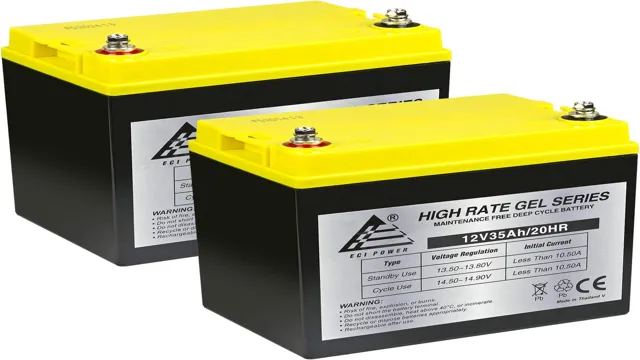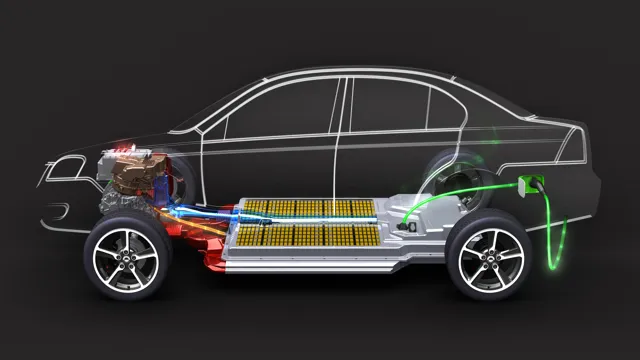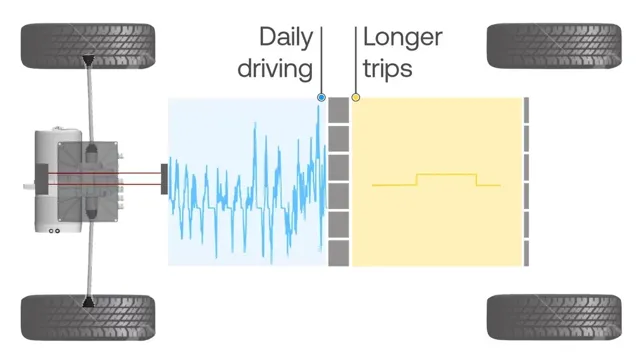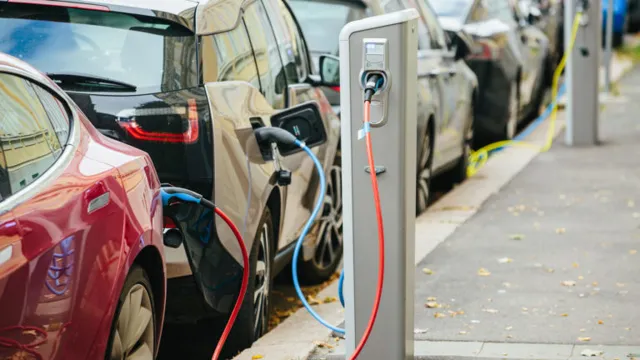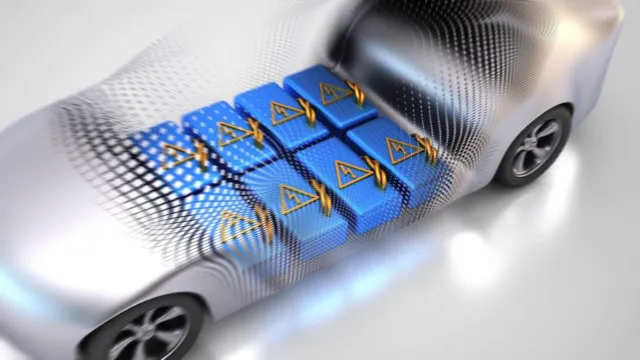Rev up Your Ride: Exploring the Latest in Electric Car Rechargeable Batteries
Electric car rechargeable batteries have been a game-changer for the automotive industry in recent years. With the increasing need for renewable energy sources and environmental sustainability, electric cars have emerged as a popular choice for drivers worldwide. However, the driving range of electric cars can be limited and inconvenient, especially when traveling long distances.
This is where rechargeable batteries come in! Innovations in battery technology have significantly increased the driving range of electric cars, making them much more practical for everyday use. In this blog post, we’ll delve deeper into the world of electric car rechargeable batteries, discussing how they work and their impact on the industry. Whether you’re a current electric car owner or considering purchasing one, this post will provide valuable insights into the technology that powers these vehicles.
So let’s dive in!
What Are Rechargeable Batteries?
Electric car rechargeable batteries are a type of battery that can be recharged and used multiple times. They are a vital component in electric cars and help store the energy needed to power the car. Rechargeable batteries are different from disposable batteries, which can only be used a single time before being discarded.
The most common types of rechargeable batteries used in electric cars are lithium-ion batteries, which offer high energy density and long cycle life. The use of rechargeable batteries in electric cars is a major contributing factor to the growing popularity of electric vehicles. These batteries provide a more efficient and environmentally-friendly alternative to traditional gasoline-powered cars.
Additionally, advances in rechargeable battery technology are driving down the cost and improving the performance of electric cars, making them more accessible to consumers.
Explaining the Basics of Rechargeable Batteries
Rechargeable batteries are a type of battery that can be recharged after use. They are designed to be reused multiple times, unlike disposable batteries that are used once and then thrown away. Rechargeable batteries come in different chemistries, including Nickel-Metal Hydride (NiMH), Lithium-Ion (Li-ion), and Nickel-Cadmium (NiCad).
Each chemistry has its own advantages and disadvantages, depending on the application. For example, NiMH batteries are great for use in everyday devices like wireless mice and keyboards, while Li-ion batteries are commonly found in smartphones and laptops due to their high energy density. Rechargeable batteries are an eco-friendly choice that can save money in the long run by reducing the need for constant replacements.
Plus, they are convenient and can be charged via a USB port, wall outlet, or solar panel.
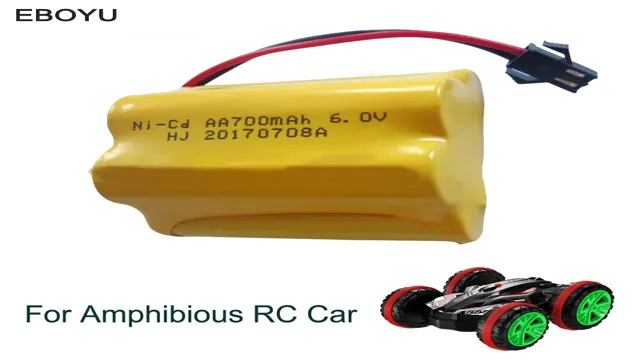
Why Are They Important for Electric Cars?
Rechargeable batteries are a vital component of electric cars, as they provide the power needed to run the vehicle. Compared to traditional batteries, rechargeable batteries are designed to be charged and used multiple times, making them more cost-effective and environmentally friendly. These batteries are made up of materials such as lithium-ion, nickel-cadmium, or lead-acid, which allows for energy storage and discharge.
The use of rechargeable batteries in electric cars has allowed for longer driving ranges and improved performance, as they can hold larger amounts of energy than traditional batteries. Additionally, the ability to recharge the batteries allows for a more convenient and accessible charging process, which is crucial for drivers who rely on their electric cars for daily use. Overall, rechargeable batteries play a crucial role in the advancement of electric cars and the movement towards sustainable transportation.
Types of Rechargeable Batteries
When it comes to electric cars, rechargeable batteries are a crucial component of their powertrains. There are several types of rechargeable batteries, with the most common ones being nickel-metal hydride (NiMH) and lithium-ion (Li-ion) batteries. NiMH batteries are still used in some older electric car models, but they are gradually being replaced by Li-ion batteries because of their superior energy density and longer lifespan.
Li-ion batteries, on the other hand, are lighter, smaller, and more efficient, making them the preferred choice for most modern electric cars. Another type of rechargeable battery that is gaining popularity in the automotive industry is the solid-state battery, which has the potential to offer even better energy density and safety than Li-ion batteries. However, solid-state batteries are still in the development stage and not yet available on the market.
Overall, the type of rechargeable battery used in an electric car depends on a variety of factors such as cost, performance, and safety.
Comparing Lithium-Ion, Nickel-Cadmium, and Lead-Acid Batteries
When it comes to rechargeable batteries, there are three main types worth considering: lithium-ion, nickel-cadmium, and lead-acid. Each of these battery types has its own unique characteristics and advantages, making them ideal for different applications. Lithium-ion batteries are widely used in modern electronic devices and electric vehicles due to their high energy density and long lifespan.
They’re also lightweight and relatively small, making them perfect for portable applications. Nickel-cadmium batteries, on the other hand, have been around for quite some time and feature a higher capacity and longer lifespan than other rechargeable batteries. They’re also less expensive than lithium-ion batteries but are bulkier and heavier.
Finally, lead-acid batteries are commonly used in vehicles and backup power systems due to their reliability, low cost, and high capacity. However, they’re also more massive and require regular maintenance, making them less suitable for portable applications. In summary, choosing the right rechargeable battery for your needs depends on several factors such as capacity, lifespan, weight, and cost.
Consider your needs and select the best battery that will meet those requirements while being within your budget. That way, you can ensure optimal performance and longevity from your rechargeable battery.
Advantages and Disadvantages of Each Type
When it comes to rechargeable batteries, there are a few different types to choose from, each with their own advantages and disadvantages. The most common types include nickel-cadmium (NiCad), nickel-metal hydride (NiMH), and lithium-ion (Li-ion) batteries. NiCad batteries are known for their durability and ability to handle high current loads, making them a popular choice for power tools and other high-drain devices.
However, NiCad batteries are also known for their environmental impact and tendency to lose power over time. NiMH batteries, on the other hand, have a higher energy density than NiCad batteries and are more environmentally friendly. However, they also tend to have a shorter lifespan and can be affected by cold temperatures.
Li-ion batteries are the most popular choice for consumer electronics and offer a high energy density, long lifespan, and low self-discharge rate. However, they can also be prone to overheating and require proper handling to avoid safety hazards. Ultimately, the best type of rechargeable battery will depend on the specific needs and intended use of the device.
Which One Is Best for Electric Cars?
When it comes to electric cars, rechargeable batteries are essential. There are several types of rechargeable batteries in the market, including lithium-ion, nickel-metal-hydride, and lead-acid batteries. However, the most common and widely used type of rechargeable battery for electric cars is the lithium-ion battery.
Lithium-ion batteries have a higher energy density, which means that they can store more energy per unit of volume compared to other types of rechargeable batteries. They are also lighter and have a longer lifespan, making them a practical and cost-effective option for electric cars. On the other hand, nickel-metal-hydride batteries have a lower energy density and a shorter lifespan than lithium-ion batteries.
Lead-acid batteries are even less suitable for electric cars due to their heaviness and short lifespan. Therefore, it’s safe to say that the lithium-ion battery is the best option for electric cars, considering factors such as energy density, lifespan, and practicality.
Charging Electric Car Batteries
Electric car rechargeable batteries are the heart and soul of an electric vehicle. They are the reason why electric cars can travel for miles without emitting any harmful pollutants into the environment. However, just like any other rechargeable battery, they need to be charged regularly.
There are different ways to charge electric car batteries, depending on the size and type of battery and the charging infrastructure available. The most commonly used methods are Level 1 and Level 2 charging, which can be done at home or at public charging stations. Level 1 charging takes longer but can be done with a regular wall outlet, while Level 2 charging requires a special charger that provides a faster charge.
Another method is DC fast charging, which can charge the battery up to 80% in just 30 minutes, but requires a dedicated charging station and is not available everywhere. It is important to note that overcharging or undercharging the battery can lead to decreased performance and lifespan, so it is essential to follow the manufacturer’s recommendations for charging the battery. With proper maintenance and charging, electric car rechargeable batteries can last for many years and provide a reliable and sustainable source of energy for transportation.
Different Charging Options Available
Charging an electric car has never been easier with the different charging options available today. The most common way to charge an EV is to use a home charger, which is usually installed in the garage or driveway. This charger plugs into a standard household outlet and can fully charge an EV overnight.
Another option is to use a public charger, which is found in parking lots, shopping centers, and other public areas. These chargers come in two types: Level 2 and DC fast chargers. Level 2 chargers are the most common and can charge an EV in a few hours while DC fast chargers can charge an EV up to 80% in just 30 minutes.
In addition to these options, there are also mobile chargers that can be used on the go to charge an EV battery. It’s important to note that the charging time and range will vary depending on the type of charger and the model of EV. Nonetheless, with the availability of these charging options, owning an electric car is becoming more and more practical for everyday use.
How Long Does It Take to Charge an Electric Car Battery?
Electric car batteries are becoming more and more popular with each passing year, and people are beginning to ask, “how long does it take to charge an electric car battery?” The answer to this question depends on several factors, such as the size of the battery, the type of charger used, and the level of charge required. In general, a full charge for an electric car battery can take anywhere from thirty minutes to several hours, depending on the situation. Some chargers are more powerful and can charge an electric car’s battery in thirty minutes or less, while others may take several hours to fully charge the battery.
It’s important to note that different cars require different charging times, and for this reason, it’s essential to read the owner’s manual to get an accurate estimate of how long it takes to charge the battery. Regardless, charging an electric car battery is a fairly quick and easy process, especially when compared to the time and effort required to fill up at a gas station. So, if you’re considering making the switch to an electric vehicle, keep in mind that you can expect to spend less time charging your car than you would filling up at the pump.
Maintaining Electric Car Batteries
Electric car rechargeable batteries are the most essential component of the vehicle to ensure its long-term sustainability. If you own an electric car, it’s important to know how to maintain its battery life to maximize its efficiency. One of the most effective ways to keep a healthy battery is by reducing the frequency of rapid charges and discharges as it can strain the battery’s health.
Make sure not to leave the battery at a low charge for a prolonged period of time. Additionally, keeping your electric vehicle parked in a cool and dry environment helps to stabilize the battery, avoiding excessive heat and moisture, both of which can damage it. Regularly checking the battery’s fluid levels and keeping the contacts clean and well-connected are essential steps to keep your electric car running smoothly.
By following these simple tips, you can prolong the battery life of your electric vehicle, and make sure you get the maximum return on your investment.
Tips for Extending Battery Life
Maintaining electric car batteries is an essential aspect of extending the life of your vehicle and saving money in the long run. One of the first things you can do is avoid overcharging your battery. When the battery is fully charged, unplug it immediately to prevent any damage caused by overcharging.
Additionally, you should avoid discharging the battery entirely before recharging it. It’s also important to keep the battery cool, as high temperatures can cause it to degrade faster. You may want to invest in a battery insulation cover or park your car in a cooler area to prevent the battery from getting too hot.
Finally, make sure to use the recommended charger for your electric car battery. Using a non-recommended charger can cause damage to the battery, which can lead to a shorter lifespan. By following these tips, you can help ensure that your electric car battery lasts as long as possible and save money on replacements in the future.
When Should You Replace Your Electric Car Battery?
Maintaining Electric Car Batteries Electric vehicles (EVs) are becoming increasingly popular, and so is the concern about the lifespan of EV batteries. But how long an electric car battery lasts largely depends on how well it’s maintained. This means paying attention to factors such as temperature, driving habits, and regular maintenance.
Extreme temperatures, both hot and cold, can negatively impact a battery’s lifespan, so it’s essential to park in shaded areas or garages and avoid overcharging or fully draining the battery. Aggressive driving, such as rapid acceleration or frequent hard braking, can also put a strain on the battery, reducing its lifespan. Regular maintenance, including software and firmware updates, checking battery fluid levels, and tire pressure, can ensure that the battery operates at its maximum efficiency, prolonging its lifespan.
Ultimately, it’s crucial to follow the manufacturer’s guidelines for battery maintenance, but with proper care, an electric car battery can last for several years. So, when should you replace the battery in your electric car? Typically, EV batteries last anywhere from 5 to 15 years, depending on the model and usage. Suppose you experience a significant reduction in battery range or have trouble charging the battery in your electric vehicle.
In that case, it’s worth consulting a professional mechanic to assess if the battery needs to be replaced.
Conclusion and Future of Electric Car Batteries
In conclusion, when it comes to electric cars, rechargeable batteries are the power source that keeps them going. They are a marvel of engineering, allowing us to enjoy emission-free transportation and make strides towards a sustainable future. But despite their many benefits, rechargeable batteries are not without their challenges.
From range anxiety to concerns about their environmental impact, there are still plenty of issues to be addressed. However, as technology continues to improve and we find new ways to harness the power of electricity, the future of electric car batteries looks brighter than ever before. So buckle up, and get ready to ride into a future that’s powered by rechargeable batteries!”
FAQs
What are rechargeable batteries in an electric car?
Rechargeable batteries in an electric car are the batteries that power the car. They can be charged by plugging the car into an electrical outlet or through regenerative braking.
How long does it take to recharge an electric car battery?
The time it takes to recharge an electric car battery depends on the size of the battery and the charging method used. A standard 110-volt outlet can take up to 20 hours to fully charge a battery, while a fast charging station can charge the battery to 80% in as little as 30 minutes.
How much does it cost to replace an electric car battery?
The cost to replace an electric car battery varies depending on the make and model of the car and the size of the battery. On average, a replacement battery can cost between $5,000 and $15,000.
How long can an electric car battery last?
The life of an electric car battery depends on a variety of factors, including the make and model of the car, the size of the battery, usage patterns, and environmental conditions. Some batteries have a lifespan of up to 10 years or more, while others may need to be replaced after only a few years.
